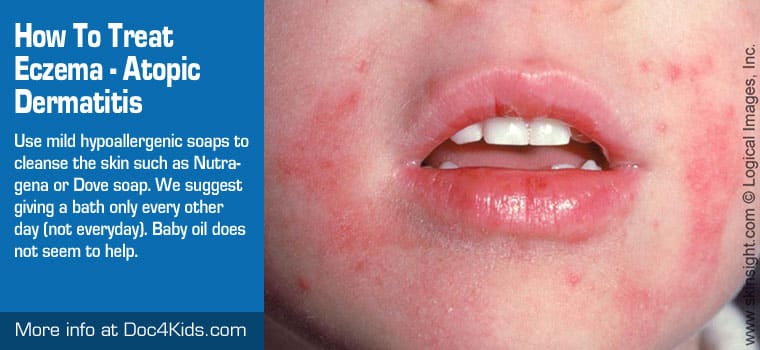ATOPIC DERMATITIS (ECZEMA) AND HOW TO TREAT IT
ATOPIC DERMATITIS (also known as eczema) is a chronic inflammatory condition of the skin occurring in many children. This may occur as a response to contact with irritants, which can inflame the skin, or from foods that the child develops an allergy. Reasons for this inflammatory process are probably due to the relative lack of protection to tissue fluid loss from the upper layer of skin. It is usually worse in the wintertime and is seen in children who tend to bathe frequently. Since these children lose a lot of moisture from the skin, the children have dry, inflamed skin. It is felt that children come into contact with irritants which may inflame the skin. When these children wash their skin, they remove the upper layer of protective lipids (fats) from the skin. This leads to the moisture loss. The skin then gets chapped and may split. The children may then develop intense itching. There is a vicious cycle of intense “itch-scratch-inflammation.” Some of the most common irritants are soaps, detergents, fabric softeners, wool, perfumes or chemicals that irritate the skin causing the child to itch and scratch. The worst offending agent is cigarette smoke, so PLEASE try to stop all smoking around your child. Inflamed skin reacts by becoming red, itchy, scaly and irritated.
As with any skin disorder, the best prevention is to avoid the offending irritant. Therefore, use Ivory Snow or Dreft when washing your child’s clothes. Try not to use any fabric softener sheets such as Snuggles or Bounce as these may add irritating perfumes to the baby’s clothes. A second rinsing cycle may help to rid the clothes of any offending chemicals.
Use mild hypoallergenic soaps to cleanse the skin such as Nutragena or Dove soap. We suggest giving a bath only every other day (not everyday). After the child is out of the bath, blot them dry (do not rub them) and use a small amount of Vaseline and immediately rub it onto the child’s skin to trap the moisture in the skin. Do this because many children do not have the natural moisture to protect the skin. You may use Lubriderm, Eucerin Cream or Moisturel to help moisturize the child’s skin. Baby oil does not seem to help.
If your child’s condition is severe, we may prescribe a mild steroid to use on the child’s skin. Please put any steroid on the affected area sparingly as directed by the Doctor. It is a good idea to cut your child’s fingernails so that the child will not abrade and potentially infect the skin. Oral Benadryl also may be used and the Doctors will give you the dosage for this. Benadryl is used to stop the child from itching. One of the side effects of this is that it may tend to make the child slightly drowsy so consider giving this at bedtime.

